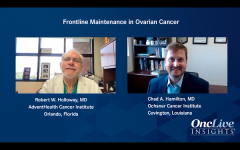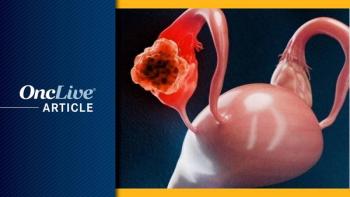
Genetic Counseling for Ovarian Cancer
Oncologists debate the need for genetic counseling for ovarian cancer patients and how to approach molecular testing alongside neoadjuvant chemotherapy.
Episodes in this series

Chad A. Hamilton, MD: Do you have genetic counselors that are in the mix with you, or do you do most of that out of your office? You mentioned that you have midlevels help out with it.
Robert W. Holloway, MD: Yes, I might be a bit of an outlier. I don’t know. When I hear from most of our colleagues, it’s often stated in talks how important genetic counseling is. We have a volume of patients in central Florida, so it would be difficult to say that every patient with ovarian cancer could get in to see a genetic counselor. Given that the guidelines are clear that every patient with ovarian cancer needs germline testing, I don’t think they need to see genetic counselors. I know that’s been a standard in many large cancer institutes around the country. I wonder if they haven’t adapted so the provider is getting the frontline germline testing. We have genetic counselors available, and some of the testing companies have online counseling available. But I use them in circumstances where patients have uncertain family histories. I need someone to spend more time with the patient to figure out if they are at risk in those situations.
With our midlevels in the clinic who take a very active approach with this counseling, it doesn’t take much time to give the patient their germline report and ask them about how many siblings and how many daughters, and if the male siblings have children, and explain to them the 50/50 transmission rate of BRCA and that everyone needs to get tested. We mention that male cancers that are associated with BRCA. We can do that in 3 minutes, and we’ll mention it at follow-up visits. “Have you given this to your family?” I oftentimes hear things like, “My brother doesn’t want to be tested and my sister does.” Then we’ll again ask them, “Would you like to get your brother in to see a genetic counselor? Would you like to get more information to convince your brother?” That’s how we triage patients. This is for BRCA and BRCA-associated genes. It’s pretty straightforward, and we handle that in our office. What do you do at Ochsner [Cancer Institute]?
Chad A. Hamilton, MD: We have genetic counselors available, but the volume far outstrips the immediate availability, so it doesn’t help us a lot if the genetic counseling visit is 3, 4, or 6 weeks down the road. We like to get things rolling because we know that this information does impact how we plan for treatment in the near term. We’re doing most of our counseling in house in the clinic. If they become more complicated or we have other cancer involved, then we get our formal genetic counselors involved.
Don’t get me wrong: the work that the genetic counselors do is phenomenal. When I read their notes, and they’ve gone through everything with the patients and their pedigrees and the implications of X, Y, Z, I wish we could have immediate access to that for every patient. But it’s not feasible with the way things are set up. We had a shortage of genetic counselors before we ran into all the shortages we’re seeing with health care personnel. That’s a long-winded way of saying that my practice reflects yours pretty closely.
I have 1 more question for you on this. It came up the other day for us. How are you working tissue testing, somatic testing, for your patients who are getting neoadjuvant chemotherapy? Do you try to send something from your first core biopsy or cytology, or do you wait till the interval procedure?
Robert W. Holloway, MD: Great question. We always get the germline testing up front with the diagnosis. If it’s a laparoscopic event, then we get a biopsy to determine whether we’re going to do primary debulk or interval debulk. I can usually get more tissue. If it’s a core needle biopsy, knowing that I’m probably going to get more tissue. I don’t need the next-generation sequencing, so immediately I prefer to wait till we go to interval debulking and get more tissue.
I’m afraid of wasting time with the core needle. They’d get the slides and say, “There’s not enough here. Can you send more?” So I’ll wait. However, some of these patients, especially the BRCA-mutation carriers, will get such a great neoadjuvant response that we don’t have much tissue when we get to the interval debulking. I’ll fall back on the core needle biopsy to get tissue. I try to get tissue on every patient and not rely on cytology for that reason if we’re going to do neoadjuvant.
Transcript edited for clarity.





































